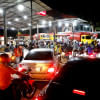Unraveling capital flight from Bangladesh

Capital flight, a growing concern for Bangladesh over the past few decades, refers to the outflow of financial assets from a country. While usual outflow may also be foreign direct investment, the problem arises when the fund transferred from a country does not have proper documentation of source and there is no intend of repatriation of the fund. This leads to loss of government revenue and depletion of foreign currency reserves.
The budget for FY23 included provision for taxing assets outside of the country that are unaccounted for. While there is no official record of the amount of capital flight from Bangladesh, this decision of the government acknowledged the phenomenon.
The economic repercussions of capital flight are multifold. Firstly, it siphons off resources that could have been utilised for productive measures to improve education, healthcare or infrastructure within the country.
Capital flight also creates an exchange rate pressure, leading to inflationary pressures and increased cost of imports. Moreover, capital flight creates unfavourable conditions for innovation and domestic development, leading to professionals and students with great potential looking for opportunities abroad. Lastly, impact on foreign exchange creates a pressure on the government to resort to external borrowing.
There are a multitude of factors leading to capital flight from Bangladesh. Policy level instability, corruption, government issues and abrupt shifts in policies lead to investor apprehension. Lack of transparent business practices and enforcement of rule of law can lead to low investor confidence and lack of willingness to comply with law.
Another issue is the lack of economic diversification. Heavy reliance on RMG industries leaves the economy vulnerable to external pressures and shifting global demand. Cumbersome bureaucratic processes and regulatory hurdles also discourage investors seeking streamlined procedures and high ease of doing business.
These outflows are surpluses from some legal but mostly illegal maneuverings and therefore are not reutilised in domestic operations and in the interest of growing industries locally. Economists have pointed out that the illegal outflow of capital is used to acquire property abroad or in conspicuous luxury consumption. In other words, illicit financial outflows enable the extravagant enrichment of certain politically influential families and dishonest government officials at the expense of entire country.
Such illicit financial outflows are a clear sign of poor controls or more likely the lack of desire to enforce strong financial controls due to fear of exposing those culprits who are too powerful.
There has been a lot of research on what happens to national economic development when rampant corruption is allowed through illicit financial flows. It is, therefore, hugely concerning that our own authorities and policy makers do not appear to be fully aware of or admit to the impact that illicit financial outflows have had on Bangladesh.
Alternatively, if this is not ignorance or misunderstanding, then it points to deliberate collusion between corrupt public officials with private business interests and the political establishment to trivialise and dismiss what are massive financial crimes.
It is high time Bangladesh implemented strong measures for mitigating capital flight. First and foremost, proper anti-corruption measures and their implementation is required.
Development of infrastructure, improvement in transport network and energy availability is a must to attract investments. Moreover, investor-friendly policies and regulations are required to reduce bureaucracy and streamline procedures to increase the ease of doing business.
Lastly, the economy needs to diversify with increased focus on development of new products and entering new markets.
The writer is an economic analyst

 For all latest news, follow The Daily Star's Google News channel.
For all latest news, follow The Daily Star's Google News channel. 








Comments